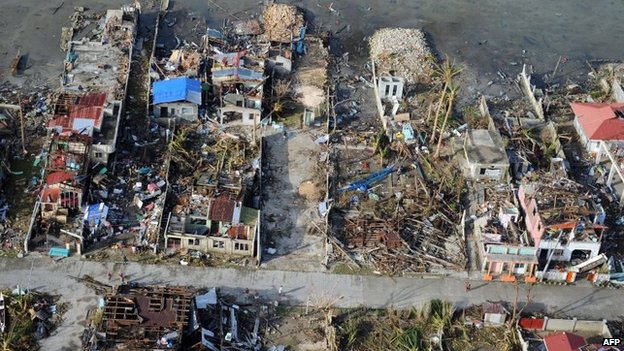
Typhoon Haiyan, the Phillipines, Nov. 11., 2013. Photo credit.
National governments have proven that they do not have what is required to meet the global challenges of climate change and the unsustainable use of our planet’s resources. The shortcomings of the United Nations Framework Convention on Climate Change (COP) meeting since Copenhagen acts as testament to this. With the burden of recession and austerity, short-sighted national governments have thus far shown themselves unable to handle sustainable development issues.
Within the arena of sustainable development, the boundaries of responsibility are undergoing a monumental shift. This allows new actors to take pole position in the creation of new opportunities. Old infrastructures are being replaced by new ones that are better designed to cope with the challenges facing cities and regions.
We should stop directing our attentions and frustrations towards impotent governments. Instead we must focus on more localized models that simmer from below but come to influence and inspire national actors to greater action.
When will we see mayors and regions act at the COP meetings?
Better levels of engagement and the development of local and international networks have prompted a wider range of actors to become involved in sustainability, from both within and outside the market.
Over the past five years we have seen several strong international networks emerge from municipalities and regions. To get a wider understanding of this phenomenon I undertook some research that shows just how many locally-focussed organizations use their involvement in these networks to bring about sustainable solutions that can have a real impact.
Mayors, get involved and give your local voice in front of, and at, the COP19 meeting in Warsaw taking place right now. When will we see mayors and regions act at the COP meetings?
The 33 networks that can act are:
1. United Cities and Local Governments - http://www.cities-localgovernments.org/
2. United Cities and Local Governments of Africa (UCLGA) - http://www.uclga.org/pages/homepage/?#1
3. Federación Latinoamericana de Ciudades, Municipios y Asociaciones (FLACMA) / Latin American Federation of Cities, Municipalities and Associations of Local Governments - http://www.portalambientallatinoamericano.com/
4. UCGL Euro-Asian Regional Section - http://www.euroasia-uclg.ru/index.php?lang=en
5. UCGL- Asia-Pacific - http://www.uclg-aspac.org/
6. Council of European Municipalities and Regions (CEMR) - http://www.ccre.org/en/
7. UCLG-Middle East and West Asia (MEWA) - http://www.uclg-mewa.org/
8. METROPOLIS Network (World Association of Major Metropolises) - http://www.metropolis.org/
9. Union of the Baltic Cities - http://www.ubcwheel.eu/
10. International Council for Local Environmental Initiatives – ICLEI (Local Governments for Sustainability) - http://www.iclei.org/index.php?id=801
11. C40 (Large Cities Climate Leadership Group) - http://live.c40cities.org/
12. Clinton Foundation’s Climate Initiative - http://www.clintonfoundation.org/main/our-work/by-initiative/clinton-climate-initiative/programs/c40-cci-cities.html
13. World Mayor Council on Climate Change - http://citiesclimateregistry.org/
14. Sustainable Cities Network - http://www.sustainablecities.net/
15. United Nations Human Settlements Programme (UN-Habitat) - http://www.unhabitat.org/content.asp?typeid=19&catid=540&cid=5025
16. United Nations International Strategy for Disaster Reduction (UNISDR) - http://www.unisdr.org/campaign/resilientcities/
17. World Bank - http://blogs.worldbank.org/sustainablecities/about-us
18. Cities Alliance - http://www.citiesalliance.org/
19. World e-Governments Organisation of Cities and Local Governments (WeGO) - http://www.we-gov.org/history
20. Mercociudades - http://www.mercociudades.org/
21. Unión Iberoamericana de Municipalistas (Iberoamerican Union of Municipality Authorities – UIM) - http://www.uimunicipalistas.org/#/sobrelauim.txt
22. Federación de Municipios del Istmo Centroamericano (FEMICA) – Federation of Central American Municipalities - http://www.femica.org/
23. Cities Development Initiative for Asia (CDIA) - http://www.cdia.asia/
24. CAI-Asia – The Clean Air Initiative for Asian Cities and CITYNET (The Regional Network of Local Authorities for the Management of Human Settlements) - http://www.cleanairnet.org/caiasia
25. Committee of the Regions (CoR) and Covenant of Mayors http://cor.europa.eu/en/activities/Pages/priorities.aspx
http://www.covenantofmayors.eu
http://www.eumayors.eu/index_en.html
http://ec.europa.eu/environment/europeangreencapital/index_en.htm
26. MEDCITIES - http://www.medcities.org/
27. Association of Cities and Regions for Recycling and Sustainable Resource management (ACR+) - http://www.acrplus.org/
28. Brazil – Frente Nacional de Prefeitos (National Front of Mayors – FNP) - http://www.fnp.org.br/home.jsf
29. India – City Managers Association of India (CMA) - http://www.umcasia.org/site/index.php?option=com_content&task=view&id=45&Itemid=68
30. China – China Association of Mayors (CAM) - http://www.citieschina.org/en/
31. South Korea – Governors Association of Korea - http://www.gaok.or.kr/eng/e01_intro/intro010.jsp
32. Canada – Federation of Canadian Municipalities - http://www.fcm.ca/
33. Sweden – Klimat Kommunerna – http://www.klimatkommunerna.se/
Ask the question - mobilise network, organisations and give your voice below or at LinkedIn Rio+

Kaj Embrén has been involved for over 30 years in sustainable development issues, and he has participated in the International Co-operative Green Campaign at the Earth Summit in Rio de Janeiro 1992. With Karl-Henrik Robert and Per-Uno Alm he helped start the Swedish Foundation, The Natural Step. Kaj lives in Stockholm.

Add new comment